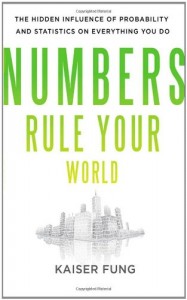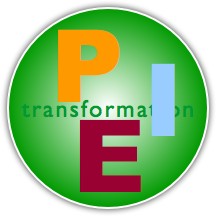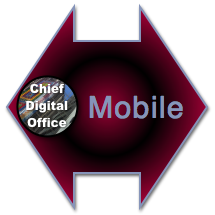 Why Machines Won’t Displace Human Workers in the Knowledge Economy is a short thought experiment, in the spirit of all Noodles, which was in response to a post in Wired. In Here’s How to Keep the Robots From Stealing Our Jobs, John Hagel posited that a major rationale for the Knowledge Economy firm would be its role as a “knowledge platform” that enabled people to accelerate their learning and productivity. I highly recommend the post, which sparked many intelligent comments. Why Machines Won’t Displace Human Workers in the Knowledge Economy is a short thought experiment, in the spirit of all Noodles, which was in response to a post in Wired. In Here’s How to Keep the Robots From Stealing Our Jobs, John Hagel posited that a major rationale for the Knowledge Economy firm would be its role as a “knowledge platform” that enabled people to accelerate their learning and productivity. I highly recommend the post, which sparked many intelligent comments.
It’s obvious that many people are having difficulties imagining the world toward which we are hurtling, a world in which machines are getting “smarter” and able to “compete” for work roles that humans now do. In writing The Social Channel App, I thought long and hard about the Knowledge Economy and people’s roles in it, and its main thesis is that everything, from states and enterprises to people and products, will be differentiated in the Social Channel and that “humanness” will assume a much more visible importance in the economy.
[…]
10 Detailed Case Studies + Big Data & Analytics’ New Digital Divide + How to Think Like a Data Scientist Book Review: Numbers Rule Your World/Kaiser Fung
 [UPDATED] Step inside a data scientist’s mind, and learn why probability is the key to profit and how it’s the key to understanding and using big data for better decision making. This fascinating and useful book clearly shows how people misunderstand probability and misuse statistics—and therefore big data—and how the knowledge gap leads to faulty models, thinking and decisions. New winners and losers are emerging in the digital social and big-data age. A new digital divide, people who think like data scientists and use probability to support decision making—and everyone else. The data science group will outperform, and Fung shows how creative, fun and useful data science is. [UPDATED] Step inside a data scientist’s mind, and learn why probability is the key to profit and how it’s the key to understanding and using big data for better decision making. This fascinating and useful book clearly shows how people misunderstand probability and misuse statistics—and therefore big data—and how the knowledge gap leads to faulty models, thinking and decisions. New winners and losers are emerging in the digital social and big-data age. A new digital divide, people who think like data scientists and use probability to support decision making—and everyone else. The data science group will outperform, and Fung shows how creative, fun and useful data science is.
This book is a perfect twin to Duncan Watts’ Everything Is Obvious* Once You Know the Answer, which exposes how common sense pervades management decisions and failure. I shall refer to several specific connections between […]
Digital Transformation’s Personal Issue reveals personal treatment to be the key to breakthrough customer experience, and it shows how digital social spaces enable Chief Digital Officers to use personal treatment to create more profit. Before they arrive, though, they need to lead their organizations through the Personal Issue. 
The Personal Issue refers to a perceived conflict between empowered customers and profit-starved companies. Digital social technologies are enabling customers to “re-personalize” business and society because their online interactions among themselves are personal, which is changing their expectations of all interactions.
However, businesses resist treating customers personally because they fear cost and inefficiency. They don’t understand the digital social economics of treating customers personally online, at scale.
Meanwhile, the missions of chief digital officers (CDOs) and chief customer officers (CCOs) are creating bold new “customer experience” and profits by using digital technologies to transform organizations, brands and businesses. They will fulfill their missions far more quickly and completely by using the key.
[…]
 Big Data in Healthcare and Education shares how U.S. and UK government agencies used big data & analytics to help evolve national policy and outcomes. These examples are useful because they show the range of big data projects; the U.S. example is simple, yet it has profound impact on the health of the citizenry and therefore on the economy. The UK example is more involved and shows in depth how organizations can use big data to address expensive programs that are full of unknowns—like national education. Big Data in Healthcare and Education shares how U.S. and UK government agencies used big data & analytics to help evolve national policy and outcomes. These examples are useful because they show the range of big data projects; the U.S. example is simple, yet it has profound impact on the health of the citizenry and therefore on the economy. The UK example is more involved and shows in depth how organizations can use big data to address expensive programs that are full of unknowns—like national education.
This post shares my notes from a recent Deloitte Dbriefs webcast, Analytics in Action, which you may watch and download its slides. The webcast was moderated by Steve Dahl, and David Weir and Haris Irshad presented the examples.
[…]
 Hightech and U.S. Healthcare Transformation recaps The Future of Healthcare: How Technology is Enabling New Models of Healthcare Delivery, which was cosponsored by Katten Muchin Rosenmann and the Illinois Technology Association. The seminar featured five panelists with various points of view: two CEOs of healthcare start-ups, one venture capitalist, one healthcare management consultant and a healthcare attorney. Hightech and U.S. Healthcare Transformation recaps The Future of Healthcare: How Technology is Enabling New Models of Healthcare Delivery, which was cosponsored by Katten Muchin Rosenmann and the Illinois Technology Association. The seminar featured five panelists with various points of view: two CEOs of healthcare start-ups, one venture capitalist, one healthcare management consultant and a healthcare attorney.
The consensus was that, at long last, U.S. healthcare is going to progress beyond the waiting room; a perfect storm of market forces and technology enablement has created the conditions for significant reform. Regulations are balancing privacy, protections and digitization, and start-ups are attacking pockets of inefficiency, often through mobile applications and cloud solutions. Technology empowers patients and providers because information is increasingly available real-time. Information enables patients to be more aware of their health as well as the ramifications of their decisions, and it can improve collaboration between provider and patient.
Government is a major change agent; the U.S. taxpayer is footing a higher and higher bill, and healthcare has absorbed all wage gains for many years now, effectively preventing Americans from improving their quality of life. Read on for my […]
 Chicago-Style Innovation is my notes from Lightbank Innovation Day, which took place on 9 May 2013 at the City Winery (presentations) and Lightbank’s offices (networking). Throughout the day, it was obvious that the Knowledge Economy’s Social Channel was unfolding; entrepreneurs’ startups are stripping off an increasing breadth of enterprise processes and using digital social software to improve them. For example, Needle’s platform creates experts in user (customer) use cases and outcomes that outperform anyone at retail; Fieldglass, HighGround, Fooda, oDesk and TalentBin take aim at various parts of human capital while Aon Hewitt showed how to practice enterprise innovation on the inside; DoubleDutch aims to [at long last] digitize trade shows and conferences through its platform’s geosocial functions. Sprout Social and Contently offered social tools. Chicago-Style Innovation is my notes from Lightbank Innovation Day, which took place on 9 May 2013 at the City Winery (presentations) and Lightbank’s offices (networking). Throughout the day, it was obvious that the Knowledge Economy’s Social Channel was unfolding; entrepreneurs’ startups are stripping off an increasing breadth of enterprise processes and using digital social software to improve them. For example, Needle’s platform creates experts in user (customer) use cases and outcomes that outperform anyone at retail; Fieldglass, HighGround, Fooda, oDesk and TalentBin take aim at various parts of human capital while Aon Hewitt showed how to practice enterprise innovation on the inside; DoubleDutch aims to [at long last] digitize trade shows and conferences through its platform’s geosocial functions. Sprout Social and Contently offered social tools.
Presenters Gian Fulgoni, J Schwan and Ramon De Leon shared valuable advice for entrepreneurs, investors and enterprise executives. Fulgoni provided statistics that showed how mobile was eclipsing ecommerce and analog commerce; Schwan opened the audience’s eyes to Ubiquitous Computing and the Internet of Things, and De Leon showed the power of (pervasively ;^) being yourself.
[…]
 Personal Individualized Experience is the DNA of digital transformation. It refers to using an optimal mix of people and digital technologies to provide personal interactions at scale, so it’s central to the mission of chief digital officers and CEOs and boards who hire them. Prior to digital and social technologies, organizations faced a trade-off between “personal” and “efficient” interactions with their stakeholders (customers, clients, employees, partners, regulators… hereafter “users”). Now this is no longer true; they can provide personal interactions at scale, once they learn how and where to interact efficiently and authentically. Personal Individualized Experience is the DNA of digital transformation. It refers to using an optimal mix of people and digital technologies to provide personal interactions at scale, so it’s central to the mission of chief digital officers and CEOs and boards who hire them. Prior to digital and social technologies, organizations faced a trade-off between “personal” and “efficient” interactions with their stakeholders (customers, clients, employees, partners, regulators… hereafter “users”). Now this is no longer true; they can provide personal interactions at scale, once they learn how and where to interact efficiently and authentically.
Used well, digital and social technologies retain an authentic human element while digitizing key aspects of relating to people. Therefore, organizations/firms/brands (hereafter “firms”) can now provide the Personal Individualized Experience (PIE). This post explains the three components of PIE and shows how firms can use them to build and maintain authentic and profitable relationships with users.
[…]
 Ubiquitous Computing Primer reveals mobile’s ultimate business context and enables astute digital executives to create a whole new layer of value from their mobile investments. “Mobile” is far more important than launching smartphone and tablet apps because “smart” devices will interact with each other to provide a new level of capability and customer experience. This primer is a very brief treatment of a complex subject, so follow its links to drill down. Ubiquitous Computing Primer reveals mobile’s ultimate business context and enables astute digital executives to create a whole new layer of value from their mobile investments. “Mobile” is far more important than launching smartphone and tablet apps because “smart” devices will interact with each other to provide a new level of capability and customer experience. This primer is a very brief treatment of a complex subject, so follow its links to drill down.
In 2013, smartphones and tablets imply that people are interacting with each other and “the Internet,” but “mobile” is becoming a “feature” of all kinds of devices and products in a phenomenon called “ubiquitous computing.”
Ubiquitous Computing Primer is Part1 of The CDO Guide to Mobile for Digital Transformation.
[…]
 U.S. healthcare transformation has been the subject of innumerable conferences, debates and programs for many years, and social business will play a large role. Reducing cost without sacrificing quality of care has become the common goal, so I believe social business will be a key lever because social technologies dramatically reduce the cost of collaboration. U.S. healthcare transformation has been the subject of innumerable conferences, debates and programs for many years, and social business will play a large role. Reducing cost without sacrificing quality of care has become the common goal, so I believe social business will be a key lever because social technologies dramatically reduce the cost of collaboration.
I have monitored healthcare reform for many years, and I sense that various factions, players and special interests are finally realizing that they must change. “Obamacare,” the protracted poor economy and a rapidly aging population are forcing many players out of their comfort zones.
I attended two events last week that provided interesting glimpses from behind the curtain, so I’ll share my notes here. One conference was co-sponsored by Baker & McKenzie and Deloitte, and the other was held at the University of Chicago Booth School of Business.
[…]
 Anonymity, Marketing and Predicting the Future shows that, although each culture has its own concepts of “anonymity” and “marketing,” anonymity will prove to have been a temporary phenomenon in most human cultures because communications technologies are counteracting it. Moreover, based on my studies of and experience with sociology, evolutionary psychology and technology, I observe that 20th century marketing is grounded in anonymity, so we can predict the future of marketing by exploring anonymity and its relationship to marketing. Anonymity, Marketing and Predicting the Future shows that, although each culture has its own concepts of “anonymity” and “marketing,” anonymity will prove to have been a temporary phenomenon in most human cultures because communications technologies are counteracting it. Moreover, based on my studies of and experience with sociology, evolutionary psychology and technology, I observe that 20th century marketing is grounded in anonymity, so we can predict the future of marketing by exploring anonymity and its relationship to marketing.
In brief, marketing’s influence is most poignant when anonymity is high and the marketing “target” is ignorant of the product/service and how to use it. In this scenario, the target is most open marketing’s influence. Read on to learn how marketing is related to anonymity, where anonymity is going and how marketing can transform to strengthen its influence.
Marketing organizations that do not transform will be sidelined because anonymity is dissipating fast.
[…]
|
|
 Why Machines Won’t Displace Human Workers in the Knowledge Economy is a short thought experiment, in the spirit of all Noodles, which was in response to a post in Wired. In Here’s How to Keep the Robots From Stealing Our Jobs, John Hagel posited that a major rationale for the Knowledge Economy firm would be its role as a “knowledge platform” that enabled people to accelerate their learning and productivity. I highly recommend the post, which sparked many intelligent comments.
Why Machines Won’t Displace Human Workers in the Knowledge Economy is a short thought experiment, in the spirit of all Noodles, which was in response to a post in Wired. In Here’s How to Keep the Robots From Stealing Our Jobs, John Hagel posited that a major rationale for the Knowledge Economy firm would be its role as a “knowledge platform” that enabled people to accelerate their learning and productivity. I highly recommend the post, which sparked many intelligent comments.
 [UPDATED] Step inside a data scientist’s mind, and learn why probability is the key to profit and how it’s the key to understanding and using big data for better decision making. This fascinating and useful book clearly shows how people misunderstand probability and misuse statistics—and therefore big data—and how the knowledge gap leads to faulty models, thinking and decisions. New winners and losers are emerging in the digital social and big-data age. A new digital divide, people who think like data scientists and use probability to support decision making—and everyone else. The data science group will outperform, and Fung shows how creative, fun and useful data science is.
[UPDATED] Step inside a data scientist’s mind, and learn why probability is the key to profit and how it’s the key to understanding and using big data for better decision making. This fascinating and useful book clearly shows how people misunderstand probability and misuse statistics—and therefore big data—and how the knowledge gap leads to faulty models, thinking and decisions. New winners and losers are emerging in the digital social and big-data age. A new digital divide, people who think like data scientists and use probability to support decision making—and everyone else. The data science group will outperform, and Fung shows how creative, fun and useful data science is.
 Big Data in Healthcare and Education shares how U.S. and UK government agencies used big data & analytics to help evolve national policy and outcomes. These examples are useful because they show the range of big data projects; the U.S. example is simple, yet it has profound impact on the health of the citizenry and therefore on the economy. The UK example is more involved and shows in depth how organizations can use big data to address expensive programs that are full of unknowns—like national education.
Big Data in Healthcare and Education shares how U.S. and UK government agencies used big data & analytics to help evolve national policy and outcomes. These examples are useful because they show the range of big data projects; the U.S. example is simple, yet it has profound impact on the health of the citizenry and therefore on the economy. The UK example is more involved and shows in depth how organizations can use big data to address expensive programs that are full of unknowns—like national education. Hightech and U.S. Healthcare Transformation recaps The Future of Healthcare: How Technology is Enabling New Models of Healthcare Delivery, which was cosponsored by Katten Muchin Rosenmann and the Illinois Technology Association. The seminar featured five panelists with various points of view: two CEOs of healthcare start-ups, one venture capitalist, one healthcare management consultant and a healthcare attorney.
Hightech and U.S. Healthcare Transformation recaps The Future of Healthcare: How Technology is Enabling New Models of Healthcare Delivery, which was cosponsored by Katten Muchin Rosenmann and the Illinois Technology Association. The seminar featured five panelists with various points of view: two CEOs of healthcare start-ups, one venture capitalist, one healthcare management consultant and a healthcare attorney. Chicago-Style Innovation is my notes from Lightbank Innovation Day, which took place on 9 May 2013 at the City Winery (presentations) and Lightbank’s offices (networking). Throughout the day, it was obvious that the Knowledge Economy’s Social Channel was unfolding; entrepreneurs’ startups are stripping off an increasing breadth of enterprise processes and using digital social software to improve them. For example, Needle’s platform creates experts in user (customer) use cases and outcomes that outperform anyone at retail; Fieldglass, HighGround, Fooda, oDesk and TalentBin take aim at various parts of human capital while Aon Hewitt showed how to practice enterprise innovation on the inside; DoubleDutch aims to [at long last] digitize trade shows and conferences through its platform’s geosocial functions. Sprout Social and Contently offered social tools.
Chicago-Style Innovation is my notes from Lightbank Innovation Day, which took place on 9 May 2013 at the City Winery (presentations) and Lightbank’s offices (networking). Throughout the day, it was obvious that the Knowledge Economy’s Social Channel was unfolding; entrepreneurs’ startups are stripping off an increasing breadth of enterprise processes and using digital social software to improve them. For example, Needle’s platform creates experts in user (customer) use cases and outcomes that outperform anyone at retail; Fieldglass, HighGround, Fooda, oDesk and TalentBin take aim at various parts of human capital while Aon Hewitt showed how to practice enterprise innovation on the inside; DoubleDutch aims to [at long last] digitize trade shows and conferences through its platform’s geosocial functions. Sprout Social and Contently offered social tools. Personal Individualized Experience is the DNA of digital transformation. It refers to using an optimal mix of people and digital technologies to provide personal interactions at scale, so it’s central to the mission of chief digital officers and CEOs and boards who hire them. Prior to digital and social technologies, organizations faced a trade-off between “personal” and “efficient” interactions with their stakeholders (customers, clients, employees, partners, regulators… hereafter “users”). Now this is no longer true; they can provide personal interactions at scale, once they learn how and where to interact efficiently and authentically.
Personal Individualized Experience is the DNA of digital transformation. It refers to using an optimal mix of people and digital technologies to provide personal interactions at scale, so it’s central to the mission of chief digital officers and CEOs and boards who hire them. Prior to digital and social technologies, organizations faced a trade-off between “personal” and “efficient” interactions with their stakeholders (customers, clients, employees, partners, regulators… hereafter “users”). Now this is no longer true; they can provide personal interactions at scale, once they learn how and where to interact efficiently and authentically. Ubiquitous Computing Primer reveals mobile’s ultimate business context and enables astute digital executives to create a whole new layer of value from their mobile investments. “Mobile” is far more important than launching smartphone and tablet apps because “smart” devices will interact with each other to provide a new level of capability and customer experience. This primer is a very brief treatment of a complex subject, so follow its links to drill down.
Ubiquitous Computing Primer reveals mobile’s ultimate business context and enables astute digital executives to create a whole new layer of value from their mobile investments. “Mobile” is far more important than launching smartphone and tablet apps because “smart” devices will interact with each other to provide a new level of capability and customer experience. This primer is a very brief treatment of a complex subject, so follow its links to drill down.